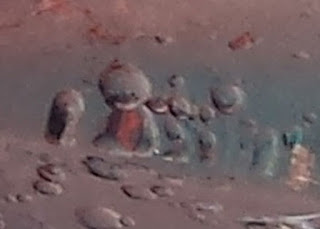The place hosts public events of whatever kind: they definitely have at least one bar—but not even one usable bathroom (the one I did find was marked "Staff only" and was locked). After hunting around the whole joint for a bathroom, I finally asked, was denied, and threatened to and then actually did piss on the barroom floor, which was suddenly, unexpectedly dirt. I soaked as much of the sod as I could—it was a good, long, horsey piss—but the bartender, the same slack-jawed yokel who had denied me bathroom use in the first place, was not impressed. But he was fairly nonchalant about it, so I didn't even get the satisfaction of pissing anybody off.
Anyway, now, something is weird about the car. Specifically about the front left (driver's) quarter, the very place I just had extensive work done (no really, 36 days in the shop, IRL, pursuant to a black ice slide into a yield sign). I pull into a petrol station and turn the car off. Well, there's your problem, says Brain, as soon as I get out of the car and look: The entire front wheel on this side is beat to hell and the tire is completely flat. No, wait, that's not a tire at all; it's a badger.
Sure, the nice man at the petrol station (of course they do repairs as well; this is upstate) can fix it, but it'll take a couple days. Meanwhile, I need to figure out how to get home and then get back up here when it's ready to be picked up. This is more worrisome than it needs to be; for some reason it takes me a long while to realize I have plenty of available credit and that Americans with plenty of available credit are fucking gods in the marketplace. Until that realization, I am stressed out, boggling at the logistics of the ordeal ahead of me.
Part of this stress is that I am starting a new job—in preparation for which I am looking through an old spiral notebook, octavo sized like I used to use in high school. This notebook might actually be that old but it appears to have mostly occupational rather than educational notes. I come across an incongruous zip-lock plastic compartment with a few pens and pencil stubs. This is clearly from the early part of my life where I thought free ball-point pens were a Good Thing.
I am sitting at the breakfast counter in the house where I grew up in Folsom, N.J., setting up my new work station. As always, there is detritus in the drawers from the last employee. But the plastic organizer tray fit into the top of the drawer does not have a compartment long enough for a full-size pen or pencil. Apparently it's a secondary tray, for paper clips and erasers and staples and things...? Roze is here with me; she has her own drawer, which I note has an appropriate organizer for writing implements. While we're setting up our work stations I am running over in my mind all that I need to do in order to accommodate the inconvenience of having my car broken down in upstate New York. This involves a good deal of shopping—or so Brain assures me, though I can't imagine now what contingency supplies I could possible need in this circumstance. I think Brain just wants retail therapy.
Somebody gives me chicken dinner; but it's clearly not a winner. (Wait, strike that. Use instead: Someone gives me chicken luncheon but it hits me like a truncheon.) It actually looks like it's some other kind of fowl, probably something just made up, because I can see in its cooked skin remnants of a row of feathers that looks like a Native American headdress rather than something that occurs naturally on an actual bird. I am more and more grossed out with the offered luncheon and my stomach has begun to complain. Little stabs of pain here and there.
Maybe there is a temporal gap at this point in which someone offered me some stomach medicine, because the next thing is that I look at the cylindrical jar of medicine I have taken and I notice it has a label stuck on it with some kind of arcane warning about its use. Perhaps this printed material is just the typical side-effect notices, but someone has also scribbled on the label a notation, in effect saying "discard ALL this stuff".
I walk through the workplace until I find one of the staff nurses that I like (this place appears to be Division of Federal Occupation Health or some such, where nurses teem abundant) and I show her the jar and the label. She looks at the product and the label and fairly quickly declares that it's fine; that we'll be fine. Petra has also had some of the stuff and speaks up as well, with concern about her own well-being. I have to point out "no really, don't use this shit" notation scribbled on the label, at which point the nurse changes her mind and confiscates the product; but she says we will still probably be ok.
Without segue I am working next to R. Michael Hodges, which entails lying in a bed next to R. Michael Hodges. (Brain never did care for subtlety.) We are still in the workplace and we are fully clothed; but I clearly have not gone through sexual harassment training.
I am deeply in love with R. Michael Hodges, as I have unalterably been since the day I met him; and, as has been the occasional case IRL, he tolerates physical affection and attention up to a point but does not pretend to be anything other than straight. Anyway, I kiss him twice behind his right ear, and that is clearly enough for the time being. We chat about work and I tell him about my broken car, my plan to retrieve it in several days, and the shopping I need to do in the meanwhile.
Later and without seeming relation to anything previous: I am at a house on a large, flat property, with a long dirt driveway coming up from a road that seems a mile away. This could be a prairie—it looks vaguely like a Western—but it could also be the tidal plain of South Jersey in a particular dry summer season. I am halfway up a ladder in front of the house (why? dunno) when someone comes up the driveway and give me the mail. It is a fistful of letters, almost all of them hand-addressed, some of them in sweetly decorated envelopes—sunsets and kittens and things.
I flip through them and quickly find one that has been misdelivered: the street name and the town are the same, but this is addressed to Whatever Terrace West, not plain old Whatever Street. Then I find one that should have been delivered to Arizona; and another bound for the U.S. state of Occiput. I toss these misdelivered envelopes into a pile on the ground. Most of the rest of the stack are similarly, wildly misdelivered: several should have gone to India, Austria, and New Zealand.
I am still on the ladder when one of the residents comes out of her house (or her part of the house; it appears to be subdivided extensively) complaining that her mail didn't come. Someone has delivered mail to her door but it did not include what she was expecting. She asks me about the stack of mail I have been sorting and I explain it's almost all misdelivered and none of it was for her; I invite her to look at the stack to be sure.
I come down off the ladder and go into the house. Residual from my sorting of the mail, I now have three gummed form pads to dispose of, in landscape format with the gum on the left side, like an old-fashioned book of checks. I believe I need to return them whence they came, but they seem not to have come in an envelope or with any information attached. Meanwhile a woman and a man are talking quietly in the front room by the window. She becomes I as we both tell the man: "I totally understand your concerns about how bad things are in America."
I am still on the ladder when one of the residents comes out of her house (or her part of the house; it appears to be subdivided extensively) complaining that her mail didn't come. Someone has delivered mail to her door but it did not include what she was expecting. She asks me about the stack of mail I have been sorting and I explain it's almost all misdelivered and none of it was for her; I invite her to look at the stack to be sure.
I come down off the ladder and go into the house. Residual from my sorting of the mail, I now have three gummed form pads to dispose of, in landscape format with the gum on the left side, like an old-fashioned book of checks. I believe I need to return them whence they came, but they seem not to have come in an envelope or with any information attached. Meanwhile a woman and a man are talking quietly in the front room by the window. She becomes I as we both tell the man: "I totally understand your concerns about how bad things are in America."


















